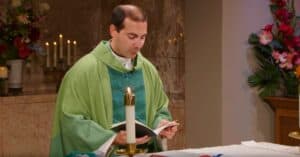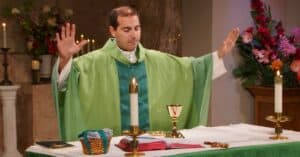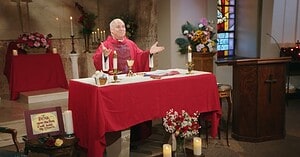Twenty-Ninth Sunday in Ordinary Time
Homily Video
Twenty-Ninth Sunday in Ordinary Time Homily Transcript
>>Truthfully, I’ve always been fascinated by Greek mythology. I love the stories of Greek mythologies and the tragedies and the victories and the gods and the pantheon. It’s just been always a fascination with me. And one of the Gods or he really wasn’t a god. He was mortal. But one of the goddesses fell in love with him and he spurned her. He wanted nothing to do with her. And so she cursed him. This human’s name was Narcissus.
You know, the flower narcissus comes from his name in the curse that you gave him. And the curse that she gave him was, he went down to a river one day and he looked into the river and he saw his own reflection. And he came so enamored with himself, he couldn’t stop looking at himself in the water. He couldn’t stop. And eventually, because of hunger and thirst, he died. And on that river bank, then Narcissus grew. You know that word? Narcissism.
We call people narcissists who are completely consumed by themselves and everything that they need. They don’t see the needs of others. It’s all about them. We all know people with narcissistic tendencies. The judge in this gospel was a narcissist. He didn’t care about anything. He didn’t care about God. He didn’t care about neighbor. He didn’t care about anything but himself and to be comfortable.
And here comes this widow. Interestingly, if you translate the word widow, it means one who does not have a voice. She’s a widow. She has really nothing. That all she has is her voice. And she goes to this narcissistic judge. She wants a just rendering in a case. And he keeps going after him and after him and after him. And he drives she drives him crazy.
So, he decides he’s going to render a judgment in her favor. It’s not because he believes in the case. It’s not because he believes in her. It’s not because he believes in justice or in God. It’s he just doesn’t want to be bothered. It’s all about himself. He says that he doesn’t want to get a black eye, which is kind of interesting or be struck by the widow. And that helps him to come to a decision to make a judgment.
Well, to be struck by her meant to get a black eye – and to get a black eye, the translation means to get a bad reputation. He didn’t want to get a bad reputation. And it was about him. Not about her, not about justice, not about the law. It was about him. He wanted to hold his ego intact. He was a true narcissist. And so, he renders in favor of the woman.
The woman in many ways could be an image of God for us. Someone who comes and asks for justice. Someone who comes to all of us and asks for our attention. God is always calling us to draw closer to God, to experience the love of God in our own lives. This poor widow. The one who seeks justice wants what is right and what is fair. God seeks justice from us, as it were. He wants what is right and fair from all of us. He wants us to draw closer in a deeper and in a loving relationship. That’s not too much to ask.
As we gather at the table of the Lord to celebrate Eucharist, to be nourished by the same God who loves us dearly. To walk then as a disciple and to the world, let us be grateful. Let us be grateful for the ways in which the Lord continually reaches out, calls to us, asks for our attention. And to follow in the ways of his son.
Readings
First Reading:
Kgs 5:14-17
Second Reading:
2 Tm 2:8-13
Gospel:
Lk 17:11-19 (144)
Featured Text
Discover More
Fifteenth Sunday in Ordinary Time
July 13, 2025
Fourteenth Sunday in Ordinary Time
July 6, 2025
Saints Peter and Paul, Apostles
June 29, 2025
Request Sunday Mass Guide
The Sunday Mass Guide sent to your home address
Spiritual nourishment and updates from the Sunday Mass community
Monthly reflections from Fr. Scott Donahue, our Principal Celebrant


